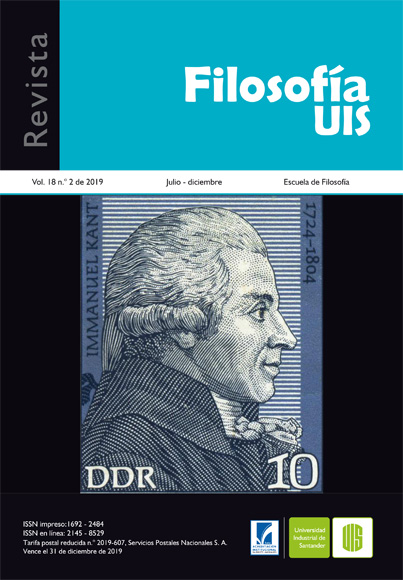The critical connection of the sickness unto death and the suicide in the thought of Kierkegaard
Published 2019-05-14
Keywords
- Kierkegaard,
- suicide,
- the sickness unto death,
- personal decision,
- authentic suicide
How to Cite
Copyright (c) 2019 Revista Filosofía UIS

This work is licensed under a Creative Commons Attribution 4.0 International License.
Abstract
At first time, the aim of this article is to identify the essential connection between the kierkegaardian concept of sickness unto death and a general concept of suicide, that reveals especially Kierkegaard’s interest in reflecting on the experience of self-destruction. As second and last resort, it expects to explain that the criticism of the concept of sickness unto death to said general concept of suicide, according Kierkegaard, doesn’t concentrate on cataloging as weak the evasion of human suffering, neither is born of experimental eschatologies after the death of the body; in fact, the critique is developed starting from the problem that supposes a “personal decision” and a polemic proposal about “authentic suicide”.
Downloads
References
Beabout, G. R. (1996). Freedom and Its Misuses: Kierkegaard on Anxiety and Despair. Milwaukee: Marquette University Press.
De Castro Lins, R. y Grunewald, A. (2018). O rosto divino do Absurdo –do suicídio de Kierkegaard. Revista Fronteiraz, (20), 222-239.
García Aguilar, J. F. (2013). Una mirada al dolor: la idea del sufrimiento existencial en el pensamiento de Sören Kierkegaard. Scientia Helmantica, 1(2), 41-63.
Kierkegaard, S. (2008). La enfermedad mortal. (D. Gutiérrez Rivero, trad.). Madrid: Trotta.
Kierkegaard, S. (2009a). La repetición. (D. Gutiérrez Rivero, trad.). Madrid: Alianza Editorial.
KIerkegaard, S. (2009b). Postscriptum no científico y definitivo a migajas filosóficas. (N. Bravo Jordán, trad.). Ciudad de México: Universidad Iberoamericana.
Kierkegaard, S. (1997-2012). Søren Kierkegaard Skrifter. N. J. Cappelorn; J. Garff; J. Knudsen; J. Kondrup y A. McKinnon (eds.). Kobenhavn: Gyldendal.
Kierkegaard, S. (1920-1936). Søren Kierkegaards Samlede Værker. A. B. Drachmann; J. L. Heiberg; H. O. Lange; A. Ibsen y J. Himmelstrup (eds.). Kobenhavn: Gyldendal.
Nueva Biblia de Jerusalén (2009). Bilbao: Descleé de Brouwer.
Ordóñez, E. J. (2010). La condición humana: de la muerte y el suicidio. Una Lectura de la obra de Albert Camus. Revista Científica Guillermo de Ockham, 8(1)183-195.
Podmore, S. D. (2011). To Die and Yet Not Die: Kierkegaard’s Theophany of Death. En P. Stokes y A. J. Buben (eds.), Kierkegaard and Death (pp. 45-64). Bloomington: Indiana University Press.
Roldán, A. (2013). La influencia de Sören Kierkegaard en la teología de Karl Barth: Dialéctica, desesperación y fe. Teología y cultura, 10(15), 40-56.
